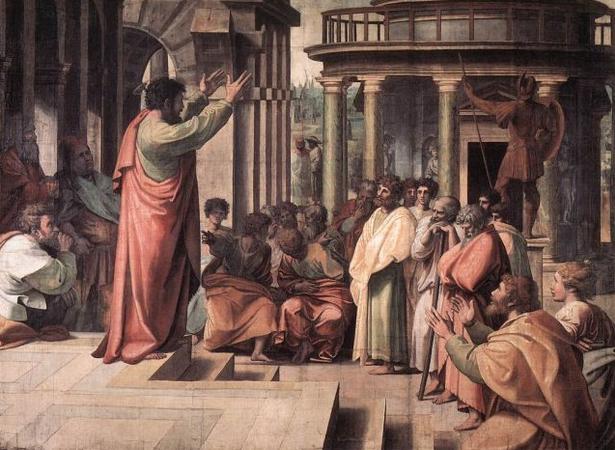Mere Christianity Today
As editors of “a journal of mere Christianity,” we are often asked what we mean by “mere Christianity.” We got this phrase, of course, from C. S. Lewis, who picked it up from the Anglican divine Richard Baxter (d. 1691). Another way of saying “mere Christianity” is “what has been believed everywhere, always, and by all,” to use the words of St. Vincent of Lerins (d. 445).
We have always maintained, as did Lewis, that this is not a lowest-common-denominator approach. It is not a political construct, listing everything everyone believes and choosing just those still agreed upon. Mere Christianity is not in flux from one generation to the next or from place to place, the denominator changing every time a doctrine is questioned and therefore insisting upon it considered “divisive.”
There are clear dividing lines that separate mere Christians from those who have lost their “salt” by having either unwittingly traveled or actively paved the road to apostasy.
The Christian’s Lord
It is imperative that these lines be marked and noted and that they be upheld on peril of our souls and defended unto death should it come to that. These are some of the features of “mere Christianity”:
• The mere Christian acknowledges that “Jesus is Lord,” and means that Jesus of Nazareth, the Son of man of the four canonical gospels, and no one else, is Kyrios—his Lord and his God.
• In saying Jesus is “Lord,” the mere Christian means that “all authority in heaven and on earth has been given” to Jesus Christ. By saying “all” he means all.
• The mere Christian confesses Jesus as both Lord and Christ because God the Father raised him from the dead—yes, the body was raised—after his suffering and death on the cross for our sins, in fulfillment of the Scriptures.
• The mere Christian knows God as “Father” and calls him so, because this is what Christ our Lord has taught us; it is also the utterance given to him by the Holy Spirit, to cry out “Abba, Father.”
• The mere Christian believes that Christ has charged all who call him Lord to make disciples of all nations, first, by baptizing them and, second, by teaching them to observe all that he has commanded.
• The mere Christian knows that, as the sovereign and divine Lord to whom all obedience is due, Jesus Christ provided for the transmission of his commandments, which are to be obeyed.
• All that our Lord has commanded—the moral and spiritual requirements of the Christian life of discipleship—are thus given to us in the apostolic deposit of the Scriptures and may be discerned in the lives of the martyrs, confessors, saints, and fathers of the church.
• The mere Christian realizes that he has received the faith from the faithful witness of the apostles and saints of the Church. While free to innovate, following Christ, who makes all things new, he is not autonomous and free to change the faith. The faith is not determined by us; it is received and passed on as delivered.
There are many more things that can be said about mere Christianity, and this should not be read as an exhaustive definition. But at the very least, we can assert that any church or any Christian claiming the name of Christ can neither be ashamed of nor deny these claims about Jesus Christ and remain Christian. Nor can he be derelict in openly and publicly proclaiming these truths regardless of the cost. Those who refuse to speak, proclaim, and defend these truths are not faithful.
The Christian’s Framework
We would find among many Christians general, indeed enthusiastic, agreement with everything I have just said. But there are other aspects of mere Christianity to which many of those people would vigorously dissent. These are sometimes doctrinal but more often moral and liturgical. Some have suggested that if we are to remain fully ecumenical, we must be willing to bracket any particular teaching or practice that certain Christians at a particular time and place might disagree on.
The mere Christian cannot do this. For example, many Christians seem either confused or culpably ignorant about abortion. Some will argue that this is a question about which sincere Christians may disagree. We believe that their desire to disagree hardly means that abortion is not a matter of mere Christianity. The sanctity of human life in the womb has been upheld by Christians from the earliest times.
The sinfulness of extra-marital sexual activity is another example. Here again some Christians propose an expansion of the moral teaching simply because so many Christians no longer live by it. Again we must say that their desire to disagree hardly means that chastity is not a matter of mere Christianity.
The biggest example, of course, is the innovation of Christian egalitarianism, including the redefinition of the family and the ordination of women. We have written a great deal on this subject and I will not go into more details here, but in this innovation we see many people who favor mere Christianity insisting that it does not include male headship, despite the hitherto universal belief in it.
The Christian’s Vision
There are other false beliefs and doctrines that cloud over the moral and doctrinal landscape of the Christian mind. Average Christians in the West today find it difficult to discern many of these. We all struggle under various forms of unseen cultural accommodations that compromise our Christian integrity and obscure our sight.
For example, to what extent have we really escaped “the corruption that is in the world because of passion” (2 Peter 1:4)? The toxins of a consumerist culture have spread far and wide in our churches. None of us is perfect, and we all see through a glass darkly. Even doctrines that we formally confess might become clear to us only after years of Christian living and worship, such that we would say we didn’t really understand them until that later moment of enlightenment.
This is all the more reason to hold tightly to mere Christianity as that which has been understood by everyone before us, even when our modern peers disagree. It is a reason to take the most expansive definition possible of mere Christianity, even when some points seem unenlightened or unprogressive. For only by walking by the sight of those gone before us can we escape the myopia of both modern, liberal Christianity and the secular consumerist culture in which we all live.
Mere Christianity is what has been believed by every Christian in every place at all times, and what we are sure will be seen to be mere Christianity when the fads and enthusiasms of the moment have finally run their course. On that day, we shall no longer see through a glass darkly, but face to face. Those who think themselves free to change, to relax, or to reinterpret the faith handed on to us by the Lord and his apostles will have some explaining to do.
—James M. Kushiner, for the editors
James M. Kushiner is the Director of Publications for The Fellowship of St. James and the former Executive Editor of Touchstone.
subscription options
Order
Print/Online Subscription

Get six issues (one year) of Touchstone PLUS full online access including pdf downloads for only $39.95. That's only $3.34 per month!
Order
Online Only
Subscription

Get a one-year full-access subscription to the Touchstone online archives for only $19.95. That's only $1.66 per month!
bulk subscriptions
Order Touchstone subscriptions in bulk and save $10 per sub! Each subscription includes 6 issues of Touchstone plus full online access to touchstonemag.com—including archives, videos, and pdf downloads of recent issues for only $29.95 each! Great for churches or study groups.
Transactions will be processed on a secure server.
more from the online archives
calling all readers
Please Donate
"There are magazines worth reading but few worth saving . . . Touchstone is just such a magazine."
—Alice von Hildebrand
"Here we do not concede one square millimeter of territory to falsehood, folly, contemporary sentimentality, or fashion. We speak the truth, and let God be our judge. . . . Touchstone is the one committedly Christian conservative journal."
—Anthony Esolen, Touchstone senior editor









